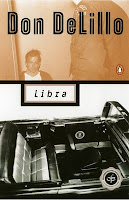The story is told through two separate time lines that converge in the final act. One narrative follows Oswald at various points in his life. The other timeline follows the conspirators as they formulate their plans. The historical context for the plot begins with the Bay of Pigs invasion. In April 1961, only three months into his presidency, President Kennedy approved a CIA operation to overthrow Fidel Castro's regime in Cuba. A force of Cuban exiles were ready to lead the invasion with American air support that Kennedy decided to pull at the last minute. The entire operation was a debacle and the military and the intelligence community never forgave Kennedy. Cuba became an obsession with them and the primary impetus for the attempt on President Kennedy's life. Delillo follows a renegade group within the CIA that covertly planned a failed assassination attempt and then blame it on Fidel Castro.
The novel picks in the sections that deal with Oswald. We first meet him as a teenager living in a Bronx tenement with his mother. A loner and often the target of bullies who mock his southern accent, he took refuge in the writings of communist revolutionaries Karl Marx and Leon Trotsky. He blamed the capitalist system for the humiliating conditions his family had to accept. At 17, he enlisted in the marines and an undistinguished service record. While he was stationed in Japan he began to learn Russian and made plans to defect. Why did Oswald enlist? Delillo portrays him as a conscientious soldier who wanted to learn firsthand the psychology behind an oppressive system. After wounding himself in a gun accident he was discharged.
Upon arriving in Russia in 1959, Oswald offered his services to the Soviets. They gave him a cool reception and suspected he was a double agent. Nevertheless, he offered them information on America's U-2 spy program of which he knew little. Unsure of what to do with him they set him up with a factory job in Minsk. While, there he meets his wife and grows disillusioned with the Soviet system. Unhappy with his social status he manages to emigrate back to the United States. Delillo paints complex portrait of Oswald, a tendency towards violence, intelligent, a fixation with guns, and determined to accomplish something important.
Every character in the book is plagued witth paranoia. They all believed they will change the course of history and yet all feel powerless before the forces that will determine their fate. This contradiction is best expressed in the David Ferrie character, a hard line anti-communist and amateur astrologer (among other things). Later in the novel he forms a bizarre friendship with Oswald and offers an analysis of the conspiracy:
Think of two parallel lines . . . One is the life of Lee Harvey Oswald. One is the conspiracy to kill the president. What bridges the space between them? What makes a connection inevitable? There is a third line. It comes out of dreams, visions, intuitions, prayers out of the deepest layers of the self.
This sets the stage the novel's final act as the two lines begin to converge.
In my opinion this was the weakest section of the book. Without offering plot spoilers, the scenario Delillo imagines is as plausible as any. But it all seems superfluous since the we already know what happened, the question is how it happened. The final fifty pages follow another oddball Jack Ruby, who would shoot Oswald three days after the killing of Kennedy. Ruby, a Dallas nightclub owner who was outraged about the assassination took it upon himself to save the city's reputation. Since Ruby owed thousands to the mob he was caught up in the nexus of mobsters, Cuban exiles, and the CIA - his story is an amusing coda to a very dark novel.
As a prominent post-modern writer Delillo avoids trying to offer answers about the Kennedy assassination. Post-modernist historians argue that all works of history only exist in the historian's mind. It is impossible to ever reconstruct a historical event. There a few flash forwards in the story to CIA archivist in the late 1970s attempting to write the official history and overwhelming number of contradictory facts and strange coincidences left him completely lost. From hindsight the attacks of 9/11 continue to haunt this generation, but it will never captivate people like the Kennedy conspiracy. This was something that happened internally and our fascination may tells us more about ourselves than we care to know.

